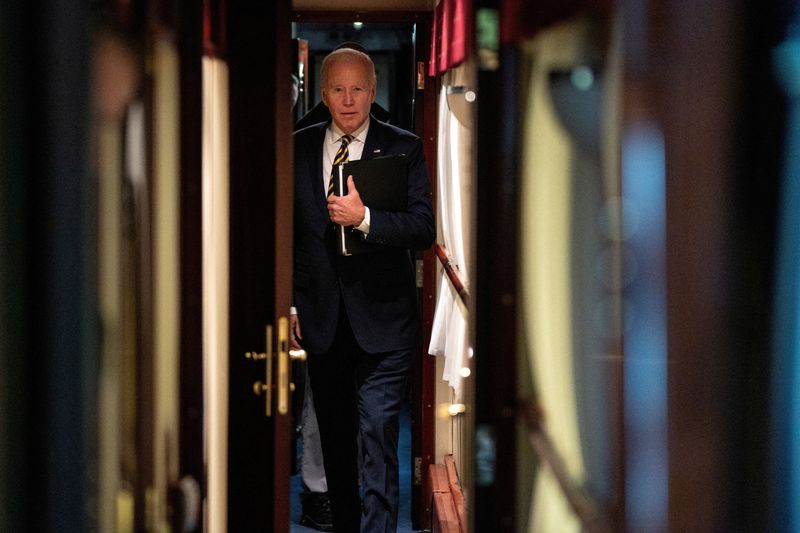By Steve Holland, Jonathan Landay and Andrea Shalal
WASHINGTON (Reuters) -The United States marked the first anniversary of Russia's invasion of Ukraine on Friday with $2 billion in weaponry for Kyiv and new sanctions against Russia aimed at undermining Moscow's ability to wage war.
U.S. President Joe Biden's administration unveiled the sanctions as the Group of 7 bloc of wealthy nations and Ukrainian President Volodymyr Zelenskiy met to discuss more aid.
Among the steps were placing visa restrictions on Russian military members, freezing assets of allies of President Vladimir Putin, effectively banning aluminum imports from Russia, curbing Russian banking and arms-making activity and putting the country's second largest mobile phone company Megafon on a trade blacklist.
Anatoly Antonov, the Russian ambassador to the United States, said the sanctions would have no impact.
Additional measures could be imposed at a later date, U.S. officials said.
The administration also sent a message to China and other countries that they should not try to help Russia evade sanctions.
"We will sanction additional actors tied to Russia's defense and technology industry, including those responsible for backfilling Russian stocks of sanctioned items or enabling Russian sanctions evasion," the White House said.
The aid to Ukraine fell short of providing the F-16 fighter jets that Kyiv has requested and some U.S. officials are raising doubts about the ability of such measures to slow the increasing hostilities on the battlefield ahead of an anticipated springtime offensive.
Antonov said the new sanctions were "thoughtless" and designed to make Russia suffer.
"Does anyone really think that this is the way to get our country to abandon its independent policies, to force it off its chosen path towards building a multipolar world based on the principle of indivisible security, on international law and the UN Charter?" a post on the embassy's Facebook (NASDAQ:META) page quoted him as saying.
NEW PENALTIES
After the G7 meeting, the leaders issued a statement on "our unwavering support for Ukraine for as long as it takes" including with more potential sanctions.
European Union countries later overcome internal disagreements and announced a 10th round of sanctions.
The U.S. State Department's sanctions included Russian Cabinet ministers and dozens of governors and regional chiefs.
The U.S. Treasury Department's new measures hit 22 Russian individuals and 83 entities, adding to more than 2,500 sanctions imposed over the past year.
Increased U.S. tariffs will also be levied on more than 100 Russian metals, minerals and chemical products worth about $2.8 billion to Russia.
The United States also planned to announce $250 million in aid to shore up Ukraine's energy infrastructure in the face of Russian attacks. Ukraine's neighbor Moldova will get $300 million to help wean itself from energy dependence on Russia.
Prosecutors announced steps to charge a Russian national with illegally exporting counterintelligence equipment and to seize the Park Avenue, New York, apartment and other property worth $75 million belonging to Putin associate Viktor Vekselberg, whom Washington imposed sanctions on most recently in 2022.
While multiple rounds of Western sanctions have damaged the Russian economy, Putin can still fund his war. That has prompted officials to focus increasingly on third parties that are helping Russia dodge the sanctions.
Treasury included penalties on more than 30 people and companies from Switzerland, Germany and other nations for helping Moscow finance its war against Ukraine.
The Commerce Department, meanwhile, is imposing export curbs on nearly 90 Russian and third-country companies, including in China, for engaging in sanctions evasion in support of Russia's defense sector and prohibit them from buying items like semiconductors. And they are working to prevent components found in Iranian drones from making their way to the Ukraine battlefield, officials said.

Washington has warned, without producing evidence, that China is considering providing weapons to Russia. China has said more weapons would worsen the conflict.
The Biden administration has committed more than $32 billion in military aid over the past year to Ukraine, including 8,500 Javelin anti-armor systems and 38 High Mobility Artillery Rocket Systems (HIMARS) and a number of different types of drones, according to the Defense Department.